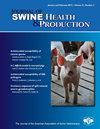Evaluating the efficacy and safety of differing gun caliber and ammunition combinations for the euthanasia or depopulation of market-weight pigs
IF 0.7
4区 农林科学
Q3 Agricultural and Biological Sciences
引用次数: 0
Abstract
Objective: Evaluate the effectiveness and safety of firearm caliber and ammunition combinations that could be used on farm for euthanasia of market-weight pigs. Materials and methods: Heads from 64 market-age pigs (32 barrows and 32 gilts) were collected from a federally inspected slaughter facility. Heads were randomly assigned to one of 4 caliber and ammunition combinations: .22 long rifle (LR), .22 Magnum (Mag), .38 Special, and 9 mm. The fully jacketed ammunition was discharged from each of the 4 unique firearms (each with a 16-in barrel length) while ensuring a consistent muzzle to forehead distance of 12.7 cm. Results: The 9 mm bullets traveled further through the head and into the ballistic gel (P < .001) and the furthest total distance (P < .001). Bullets from the .38 Special traveled further into the ballistic gel and a further total distance than both the .22 LR and .22 Mag (P < .001). The trauma area of the brain was greater for the 9 mm and the .38 Special bullets when compared to .22 LR or .22 Mag, respectively (P < .001). There was no difference in the trauma area of the brain for the .22 LR bullets compared to .22 Mag bullets (P = .12). Implications: This proof-of-concept study generated data to define efficacy and safety considerations when using a firearm to euthanize market-weight pigs and demonstrated that the .22 LR full metal jacket bullet could provide predictable euthanasia in market-weight pigs with minimal risk of contralateral emergence.评价不同口径和弹药组合对市重猪安乐死或灭群的有效性和安全性
目的:评价可用于农场对市重猪实施安乐死的火器口径和弹药组合的有效性和安全性。材料和方法:从联邦检查的屠宰场收集64头市龄猪(32头公母猪和32头后备母猪)的头。头被随机分配到四种口径和弹药组合中的一种:。22长枪(LR),。22马格南(Mag),。38特种和9毫米。全护套弹药从4支独特的枪支(每支枪的枪管长度为16英寸)中发射,同时确保枪口到前额的一致距离为12.7厘米。结果:9mm子弹穿过头部进入弹道凝胶(P <.001)和最远总距离(P <措施)。.38 Special的子弹进入弹道凝胶的距离更远,总距离比。22 LR和。22 Mag (P <措施)。与。22 LR或。22 Mag相比,9 mm和。38 Special子弹的脑损伤面积更大(P <措施)。与。22 Mag子弹相比,。22 LR子弹在脑部创伤区域没有差异(P = .12)。含义:这项概念验证研究产生了定义使用枪支对市重猪实施安乐死时的有效性和安全性考虑的数据,并证明。22 LR全金属护套子弹可以对市重猪提供可预测的安乐死,且对侧出现的风险最小。
本文章由计算机程序翻译,如有差异,请以英文原文为准。
求助全文
约1分钟内获得全文
求助全文
来源期刊
CiteScore
1.80
自引率
0.00%
发文量
29
审稿时长
>36 weeks
期刊介绍:
The Journal of Swine Health & Production (JSHAP) is an open-access and peer-reviewed journal published by the American Association of Swine Veterinarians (AASV) since 1993. The aim of the journal is the timely publication of peer-reviewed papers with a scope that encompasses the many domains of applied swine health and production, including the diagnosis, treatment, management, prevention and eradication of swine diseases, welfare & behavior, nutrition, public health, epidemiology, food safety, biosecurity, pharmaceuticals, antimicrobial use and resistance, reproduction, growth, systems flow, economics, and facility design. The journal provides a platform for researchers, veterinary practitioners, academics, and students to share their work with an international audience. The journal publishes information that contains an applied and practical focus and presents scientific information that is accessible to the busy veterinary practitioner as well as to the research and academic community. Hence, manuscripts with an applied focus are considered for publication, and the journal publishes original research, brief communications, case reports/series, literature reviews, commentaries, diagnostic notes, production tools, and practice tips. All manuscripts submitted to the Journal of Swine Health & Production are peer-reviewed.

 求助内容:
求助内容: 应助结果提醒方式:
应助结果提醒方式:


